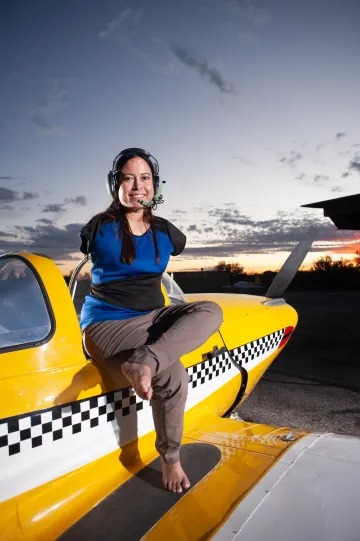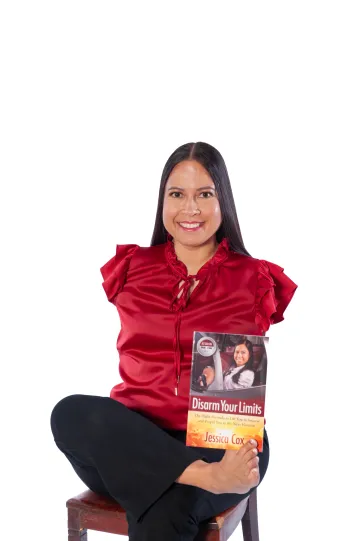To the Horizon
Jessica Cox flies with her feet.

Jessica Cox
Jessica Cox Motivational Services
As a toddler, Jessica Cox ’05 dreamed of flying. Today, the University of Arizona graduate, born without arms, is a celebrity pilot who has been invited to 29 countries to talk about her journey.
Cox tours the globe as a keynote speaker and disability advocate, promoting ways to mentor children facing challenges like hers.
“My goal to fly started as a kid on the swings,” she told attendees at a recent reception to honor winners of the Wildcat Heroes Award. “I wanted to do whatever other kids can do.”
She has achieved that, and much more.
Cox says her research suggests she is the first licensed armless pilot ever to successfully fly an airplane using only her feet.
And now she is working with students and faculty from the University of Arizona College of Engineering to design what she calls the Impossible Airplane. The project is part of a senior-level interdisciplinary capstone project, researching innovations for pilots who will fly using only their feet. For the students, it’s a required class, Engineering 498. Their goal is to design components for an all-new airplane to better meet Jessica’s needs. An assembly site in New Jersey is expected to have a prototype ready for test flight by 2025.
“We want the students to get involved in social innovation, using their skills as engineers to make the world a better place in terms of inclusion and diversity,” Cox says. “This project will show the world that disability doesn’t mean inability.”
Up to now, Cox has been flying a small aircraft called the ERCO Erocoupe, a single-engine, 85-horsepower craft with simple controls that appeal to pilots with disabilities. But Cox has ideas for an all-new aircraft that pilots without arms could fly more safely and efficiently. The Impossible Airplane, a larger, four-seater Van’s Aircraft RV-10, will be the result, incorporating Cox’s design suggestions.
David Margolis is both a U of A hand surgeon and professor of orthopedic surgery and a pilot who is advising the College of Engineering team. “Jessica is actually one of my heroes,” he says. “She’s an example of how a person with devastating injury to their hands can still do everything in life. She’s an inspiration.”

Jessica Cox
Jessica Cox Motivational Services
Cox graduated with a major in psychology and a minor in communications. Over the next three years, she became a certified pilot. Now, she is the executive director of Rightfooted Foundation, a nonprofit she created to promote mentorship and inspire children with limb differences and their families.
Her nonprofit also provides tools to help armless persons all over the world achieve independence in daily routines like dressing, one of the hardest tasks they face. One tool uses a hook attached to a suction cup to hold pants while a person wiggles in or out.
Cox practiced taekwondo and earned a black belt — and married her instructor, Patrick Chamberlain, who now is the director of her professional speaking business. Now, Right-footed Foundation offers a new curriculum for that martial art to better include participants without arms.
Never one to settle for the status quo, Cox has recently taken up golf, modifying the clubs to meet her needs and to help others without arms enter the sport. She’s driven, she says, by the impact of her efforts to do ordinary tasks.
One day when she was putting gas in her car, a man came up to her with tears rolling down his cheeks. He asked her to look over at the next gas pump, where his daughter was watching. An accident had left her without several of her fingers, and she had said she was inspired to see Cox carrying out such a difficult task without arms.
“It gave her hope,” Cox says. “That’s part of the mission I chose. To lift people up, to give people hope.”
‘We want the students to get involved in social innovation, using their skills as engineers to make the world a better place in terms of inclusion and diversity. ... This project will show the world that disability doesn’t mean inability.’
